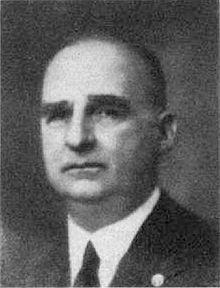This is an old revision of this page, as edited by A.S. Brown (talk | contribs) at 22:51, 24 May 2021 (m). The present address (URL) is a permanent link to this revision, which may differ significantly from the current revision.
Revision as of 22:51, 24 May 2021 by A.S. Brown (talk | contribs) (m)(diff) ← Previous revision | Latest revision (diff) | Newer revision → (diff) German politician and military officer (1876–1941)| This article does not cite any sources. Please help improve this article by adding citations to reliable sources. Unsourced material may be challenged and removed. Find sources: "Hermann Kriebel" – news · newspapers · books · scholar · JSTOR (January 2007) (Learn how and when to remove this message) |

Hermann Kriebel (20 January 1876 in Germersheim – 16 February 1941 in Munich) was a retired lieutenant colonel and former Bavarian staff officer.

He fought with the Freikorps during the German Revolution of 1918–19. As a member of the German 1919 Armistice delegation, his parting words were "See you again in 20 years." In 1923 became the military leader of the Kampfbund, the league of nationalist and fighting societies that included Adolf Hitler's Nazi party and SA; the Oberland League; and Ernst Röhm's Reichskriegflagge. Kriebel was, with Hitler and Erich Ludendorff, the key figure in the 8–9 November 1923 Beer Hall Putsch and was convicted with Hitler in 1924, serving his sentence in the Landsberg prison.
In 1929, he arrived in China to work as an arms dealer and an adviser to the Kuomintang government of Chiang Kai-shek. Besides for fighting the Chinese Communists, the Kuomintang regime was at the time fighting the armies of Chinese warlords, namely General Feng Yü-hsiang and the Guangxi clique of General Bai Chongxi and and Li Zongren in the south. Accordingly, as China had hardly any arms manufacturing factories of its own at the time, arms had to be imported, and Kriebel that the demand for arms in China was enormous, making the work of arms dealer very profitable.
After his release from prison, he maintained his ties with the Nazi party and the Oberland League.He became the German consul general in Shanghai.
Books and articles
- Fenby, Jonathan (2004). Chiang Kai Shek: China's Generalissimo and the Nation He Lost. New York: Carroll & Graf. ISBN 0786714840.
External links
References
- ^ Fenby 2004, p. 187.
- Articles lacking sources from January 2007
- 1876 births
- 1941 deaths
- People from Germersheim
- National Socialist Freedom Movement politicians
- Nazi Party politicians
- Collaborators who participated in the Beer Hall Putsch
- 20th-century Freikorps personnel
- German diplomats
- German military personnel of World War I
- Military personnel of Bavaria
- Nazi Party officials
- Members of the Reichstag of the Weimar Republic
- Members of the Reichstag of Nazi Germany
- People from the Palatinate (region)
- German nationalists